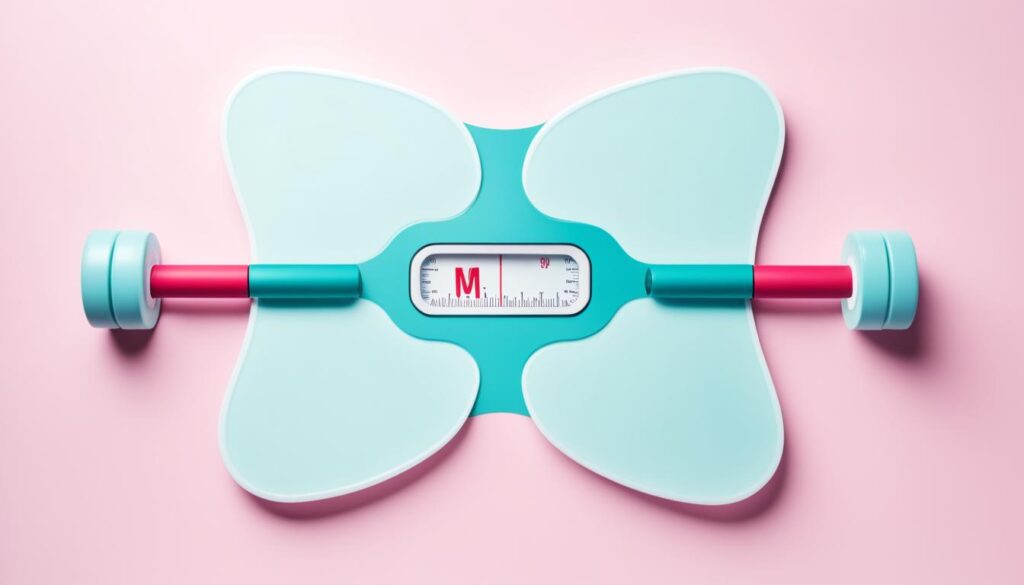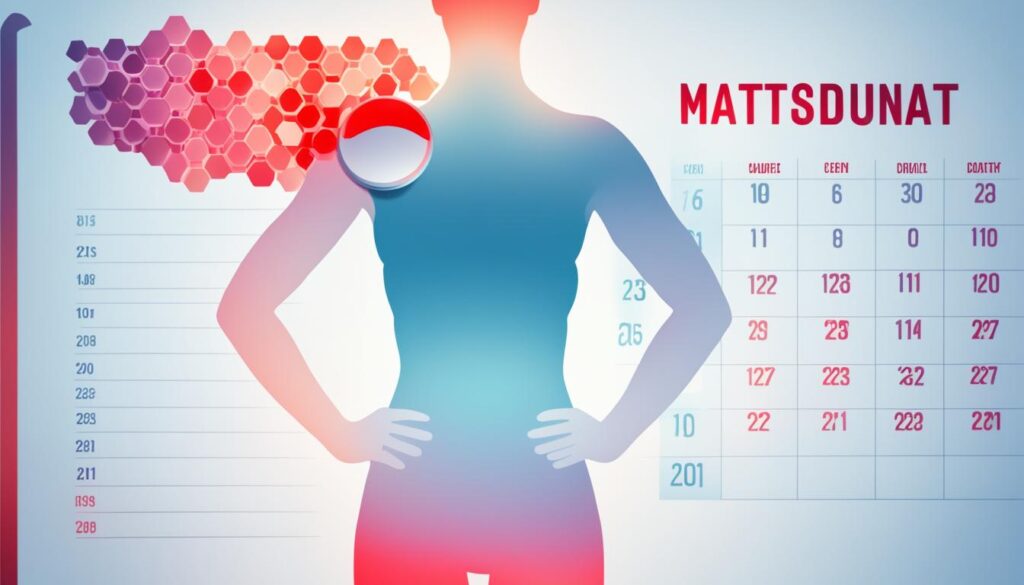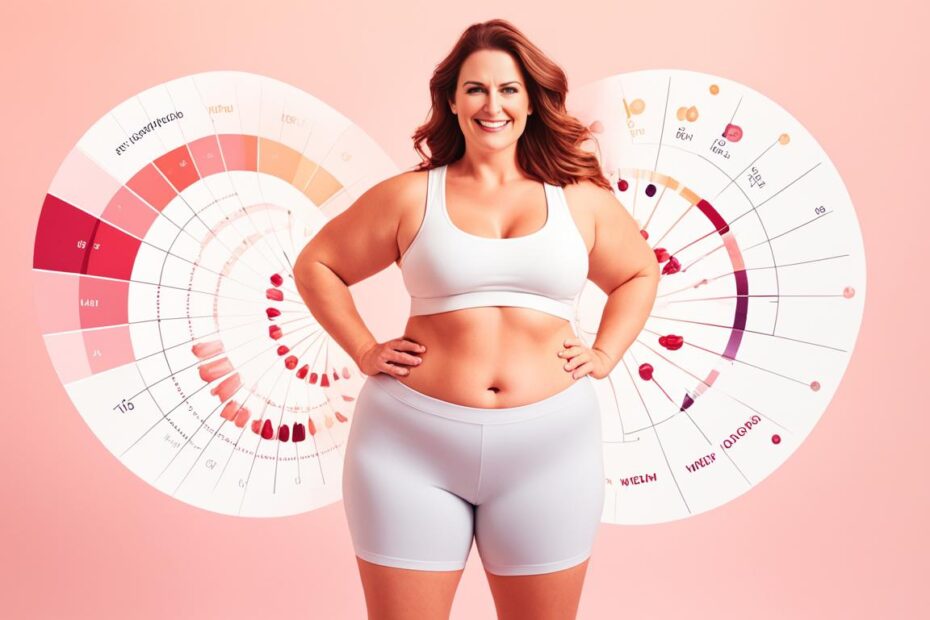I wonder if weight loss and periods are linked. Many women face this issue, but it’s not always clear how the two relate. When digging into research, I found that the impact of weight loss on is a tricky question.
Changes in weight can mess with our periods. Losing or gaining weight might make periods come irregularly or stop completely. Surprisingly, almost 80% of women who do a lot of intense exercises notice issues with their periods. This made me see how many others go through the same thing.
The link between weight and periods is not easy to understand. Sometimes, losing weight can actually help make periods more regular, especially for those who are overweight. But, losing a lot of weight fast can mess up the cycle. Putting on weight quickly might make periods heavier. Our bodies try hard to keep things in balance.
We will look deeper into how BMI, body fat, and hormones affect our periods. This knowledge can guide us in making choices for our health and bodies. It’s all about understanding how these things are connected.
The Relationship Between Weight and Menstrual Health
Weight is very important for our periods. Being too light or heavy can mess with our hormones. This could change when we get our period. Our body size and how much fat we have can change our cycles a lot.
How Body Mass Index (BMI) Influences Menstruation
Your BMI shows how healthy you are. It should be between 18.5 and 24.9. If it’s not, your periods might not be normal. Losing or gaining a lot of can cause this. It messes with how our body makes hormones, affecting our periods.

The Role of Body Fat in Hormone Production
Fat in our bodies makes hormones, like estrogen, which is important. If we have too little or too much fat, we might not have the right hormones. This is why women who are too thin may lack estrogen, and those who are too heavy could have too much. This can mess with their periods.
Weight-Related Menstrual Disorders
Your weight going up or down can cause menstrual problems. This might mean:
- Amenorrhea (absence of periods)
- Irregular periods
- Heavy menstrual bleeding
In overweight women, PCOS can make them miss periods. It’s important to know how weight and health affect our cycle. This can help keep our periods and health in good shape.
Does Weight Loss Affect Periods?
Losing weight can change your period a lot. Many women find their periods get all mixed up when they lose weight. The change in periods can vary. It depends on how much and how fast the weight is lost.

Weight loss can mess up your hormones. This can make your period lighter or it might not come as often. In the worst cases, you might not have a period at all. This is called amenorrhea.
What’s important to know about losing weight and period:
- Losing weight quickly can make your period weird
- Losing weight from a healthy place might change your cycle
- Heavy women might see more regular periods with a bit of weight loss
If losing weight is your goal, go slow. Try to lose 1-2 pounds every week. This way, your period might not change too much. Give your body time to get used to this new weight and hormones.
Be careful with very low calories and hard workouts. They can stress your body. This stress can mess up your hormones and your cycle. Eating well and having a balanced workout is key, especially when losing weight.
The Effects of Rapid Weight Loss on Your Menstrual Cycle
Losing weight fast messes with periods. This happens to many women. It’s key to know why this happens. Quick weight loss can surprise your body.
Calorie Restriction and Hormonal Changes
Cutting too many calories makes your body think it’s starving. Your hormones can go haywire. Fat helps make hormones for your period. Not having enough can make these hormones act up. This might make your periods off or stop.
Exercise-Induced Amenorrhea
Too much exercise can be a problem. Not eating enough while working out hard might stop your periods. Athletes often face this. Exercising uses up the energy your body needs for periods, and they might stop.
Stress and Its Impact on Menstruation
Stress from rapid weight loss can also mess with periods. High stress puts your body in ‘fight or flight’ mode. This changes your hormones and cycle. Cutting calories and over-exercising stress the body too much. This can make your periods act strange or stop.
Your body needs some fat for regular periods. Go for slow, healthy weight loss. Avoid quick diets that can upset your cycle. Talk to a doctor if your periods change a lot while losing weight.
How Gradual Weight Loss Can Improve Menstrual Regularity
Losing weight slowly can really help make periods more regular. I, as a woman, used to have issues with my periods being all over the place. But, I found out that losing weight steadily can help balance hormones and fix your cycle.
If you’re carrying extra weight, even a little loss can be a game-changer. Dropping 5-10% of your body weight can kickstart your period. This is especially true for women with polycystic ovary syndrome (PCOS), a condition that messes with your cycle.
Now, let’s look at how to lose weight the right way:
- Eat nutritious, balanced meals
- Exercise regularly but not too much
- Try to lose 1-2 pounds a week
Going slow means you stand a better chance of keeping the weight off. And you won’t risk messing up your period with crash diets or quick losses. Remember, your body needs time to deal with any changes. Slow weight loss lets your hormones straighten out naturally. This results in more regular periods.
If your period is acting up, see your doctor about losing weight healthily. With some patience and doing things the right way, you can get your period and weight in check.
When Weight Gain Affects Your Period
I’ve seen weight gain mess up your menstrual cycle. It’s not only the scale number. Extra pounds can change your body’s hormones.
Obesity and Menstrual Irregularities
Putting on lots of weight can change your periods. You might have too much estrogen. This makes periods heavier and longer.
The more weight you gain, the more your periods change.
Polycystic Ovary Syndrome (PCOS) and Weight Gain
If you struggle with weight gain, you might get PCOS. PCOS is when your hormones are off. This causes irregular periods.
Losing weight can fix your cycles, but it’s hard work. It’s great for your health.
Heavy Menstrual Bleeding in Overweight Women
Being overweight might give you heavy periods. This can lead to iron-deficiency anemia.
If your periods are very heavy, talk to your doctor. Discuss how weight affects your cycle.
